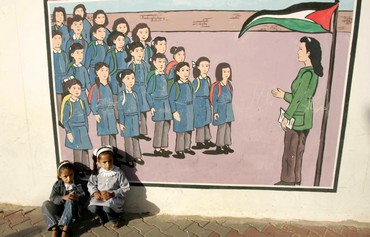The new Palestinian curriculum, which includes new textbooks for grades 1–4, is
significantly more radical than previous curricula. To an even greater extent than the
2014–15 textbooks, the curriculum teaches students to be martyrs, demonizes and
denies the existence of Israel and focuses on a “return” to an exclusively Palestinian
homeland.
Within the pages of the textbooks children are taught to be expendable. Messages
such as: “the volcano of my revenge”; “the longing of my blood for my land”; and “I
shall sacrifice my blood to saturate the land” suffuse the curriculum. Math books use
numbers of dead martyrs to teach arithmetic. The vision of an Arab Palestine
includes the entirety of what is now Israel, defined as the “1948 Occupied
Territories.”
The curriculum teaches that national institutions and authorities should be respected
and encourages personal success. Still, while Islam is not used as a radical political
tool for this age group, negative messages linger regarding non-Muslims. And though
Christian education is provided, Jewish roots are ignored. This new curriculum
appears to be a departure from the Canaanite roots narrative of past curricula, but
Arabs continue to be presented as original dwellers of the land. Palestinian identity,
as conveyed to these children, is now more realistically based on LevantinePalestinian
folklore alongside Arabism, Islam, and the struggle against Israel.
This research also revisits textbooks from grades 11–12 to reassess the Palestinian
worldview as conveyed to older students. The texts for this age group commemorate
the PLO’s armed struggle and explain the rejection of past solutions. There is a focus
on historical events involving anti-Jewish violence such as the 1936–39 (Arab) Revolt
and the Al-Aqsa Intifada. The curriculum highlights the 1974 phased program for the
conquest of the Land of Israel/Palestine. The strategy of violence and pressure (in
place of negotiations) is advocated as the most effective action to achieve Palestinian
goals, likely derived from the Sixth Fatah Conference of 2009. And in these uppergrade
textbooks, the concept of “eternal war” is instigated through the abuse of
Islamic terminology.
Within the higher-grade textbooks, there remain an absolute lack of empathy for the
“Other,” nor any comprehension or explanation of the root causes of the conflict
between Palestinians and Israelis. Thus the hatred of Israel persists. The reality that
Arab-Palestinians and Jews cooperated together in the past on a regular and
widespread basis in a variety of activities—and that they still do—is entirely missing
from the perspective of this curriculum.
Remarkably, the curriculum for grades 11–12 covers those periods in which
Palestinians were considered at first Ottomans, (part of the anti-Ottoman, Great Arab
Revolt); and later insisted on being Syrians; and then voted to become Jordanians.
The expressed Islamic and Arabic identity together with the Levantine-Palestinian
folklore stressed in grades 1–4 suggest that a cultural/regional approach may provide
the missing link to reconciliation among people in the region.
Read full report (PDF)
http://www.impact-se.org/wp-content/uploads/PA-Curriculum-2017-Revised.pdf









